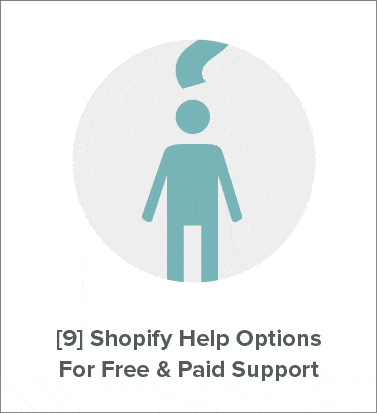In these instances, it’s important to call in reinforcements–specifically, the bounty of Shopify support experts that are trained to assist you with any number of issues you might run into while operating your online store.
In many cases, you may be able to solve the problem yourself by accessing the Shopify support channels available online. For more complicated issues, you may need to hire paid Shopify help from a professional. Either way, you have several options to choose from, and now is a good time to bookmark this article for future reference.
1. The Shopify Experts Directory – Paid
The Shopify Experts Directory is a great resource for finding paid support. Using the directory, you can easily hire a Shopify expert to assist you with all things Shopify–SEO, design, marketing, sales strategy, and more. Of course, such expertise comes at a price, so you should be prepared to invest both time and money into finding a high-quality consultant with expertise in your area of interest.
With so many Shopify experts to choose from, it can be overwhelming to know where to start. To help simplify the process, start by concretizing your specific support request(s) and from there, determine what type of expert you need (marketing? Design? Photography?); then, search the expert directory by category.
For example, for all marketing- and design-related needs, our #1 recommended Shopify expert is you guessed it my agency, Whole Design Studios, a London-based studio which has completed over 500 projects and works with over 50 Shopify stores every month. The agency now offers digital marketing services in Dubai. Visiting this page in the experts directory will lead you to dozens of client testimonials, services and pricing, as well as a simple link to contact the studio directly.
In instances where you haven’t had an expert recommended to you, consider sending support requests to multiple experts. However, make sure that you tailor each request to the individual expert you are contacting. Remember that these experts are also trying to grow a consulting business and their time is valuable; sending a request for support that is poorly matched to an expert’s speciality is a waste of time for everyone.
That said, don’t overwhelm yourself by engaging in conversations with too many experts at once, as this will be time-consuming and create confusion. Start by contacting two or three experts, and see how the screening process goes. From there, you’ll either find an expert that’s a great fit for you, or you will learn which questions are better or unnecessary to ask the next time around.
Finally, consider working with Shopify experts who you understand culturally. While it may be far less costly to offshore your work, you will likely pay the price on the backend, in the form of language barriers, miscommunications, and oddly-timed meetings held in inconvenient time zones.
2. Shopify Support (Shopify Gurus) – Free
Another first-stop resource for Shopify issues is Shopify’s own support channel, located within the Shopify Help Center.
From the drop-down support menu, you have several options. You can contact Shopify gurus directly for help via chat, email, phone, or Twitter. These gurus are available to answer questions about your specific Shopify plan, as well as direct you to other resources that will help you resolve your problem.
Also within the Shopify support channel are video tutorials, available on Shopify’s YouTube channel, access to the Shopify community and its discussion forums, Shopify webinars, and the Shopify Changelog, which is a great resource for learning about recent updates to the platform.
3. Shopify Theme Creator Support – Free/Paid
So you bought a Shopify theme from the Shopify marketplace. Do you know if it was designed internally by Shopify, or built by a third party, such as Lots, Pixel, or Underground, and sold on the marketplace? This is an important piece of information, as it will dictate where you should turn for Shopify theme support once you’ve purchased and installed your theme.
If your Shopify theme was built internally, search the Shopify Help Center for your theme-related question, and if necessary, reach out to Shopify Support for additional assistance.
If your theme was built by a third party, first visit the company’s website and browse their help center for solutions to your problem. Submit a ticket with your specific query if you don’t find a relevant answer in the help center.
Whether you contact Shopify directly or reach out to a third party theme developer, you’re in luck. These support teams are fantastic. They can explain the capabilities of your theme, and will even spend a few minutes on a call helping you set up theme options and configurations. While this theme-related support is typically free, be aware that you may be charged a fee for the support help if your issue is complicated and can’t be resolved in a 5-10 minute call.
4. App Developer Support – Free/Paid
The number of apps that are being built to help online merchants manage and enhance their Shopify stores is huge and always climbing. The rapid growth of this market comes with a huge benefit to Shopify store owners in the form of a wide variety of Shopify apps made to optimize your Shopify store; from inventory management to marketing to customer retention–there’s an app for that. However, this market expansion also means that there’s a wide range in terms of the quality of support offered by app development teams.
Because the apps created for Shopify stores are so niche, it is often difficult to know which app to choose within a specific category. Usually, what distinguishes one app from another is the quality of support. One way to assess a specific app developer’s support quality before making your choice, is to send some pre-sales requests to the app team. Go with the app that provides the fastest and most reliable support.
Similar to the theme support teams, app support teams will typically offer their customers free support up to a certain limit; any remaining requests that exceed the time limit are subject to a fee.
5. Private Facebook Groups — Free
Another great free resource for Shopify store owners is, believe it or not, Facebook. There are dozens of Facebook groups dedicated to supporting Shopify merchants.
These Facebook groups can be an invaluable resource to you as a Shopify store owner: they give you direct access to a community of thousands of other Shopify business owners who face the same doubts, wins, challenges, and questions as you.
However, given the growing number of Facebook groups dedicated to providing peer-to-peer Shopify support, it is important to be discerning. In the world of Facebook groups, less is more. According to our friends at storetasker, if you’re a member of 5 Shopify facebook groups, it’s too many. Be selective! Look for communities that are well-moderated and have several thousand members. And of course, as always, do not blindly accept the truth or utility of all online advice. Make sure to pick and choose the tips that work for you and your business.
Here’s a list of our favorite Facebook support groups for Shopify store owners:
1. General support for online businesses: A Better Lemonade Stand
2. Branding/Marketing: Shopify Traffic Academy
3. Marketing/Scaling: Shopify Strategy
4. Facebook ads: Kingpinning
5. Facebook ads/Product sourcing: Justin Cener Mastermind
6. Google – Free
As with most questions these days, the first place you should look for an answer is on Google. It’s fast, it’s free, and it will take you straight to articles and forum discussions that address your specific issue.
In fact, if you search for a Shopify-related question on Google, many of your search results will link you directly to the Shopify Help Center, which is an equally good place to start searching for a solution to your problem.
7. Official Shopify Forums – Free
As mentioned briefly above, the official Shopify forums are an excellent place to receive free Shopify support. These forums discuss topics related to ecommerce generally, Shopify specifically, and also broader issues of entrepreneurship in the digital age. Bookmark the above-linked page; these forums will become your lifeline as your Shopify business grows.
8. Shopify podcasts – Free
Another free resource to keep in your back pocket is the Shopify Masters podcast. This podcast helps business owners launch and grow a profitable Shopify store by providing listeners with advice and inspiration gathered through weekly interviews with successful ecommerce entrepreneurs.
9. Online courses – Free/Paid
Last but certainly not least: online courses! Online courses are a great way to expand your understanding of the ecommerce world and learn specific strategies for tackling the issues you face as a Shopify merchant.
For example, if you’re interested in increasing your online sales, we’ve found AcquireConvert’s Ecommerce Conversion Rate Optimization Best Practices to be an invaluable asset. It is a five-lesson course, including 51 ecommerce best practices, supported by case studies.
RisePro is another source that is extremely helpful for Shopify merchants looking to use Instagram marketing to drive traffic to their online store. RisePro offers many resources, but most notable is their free, live online video training for business owners seeking a step-by-step process to gain more followers, traffic, and ecommerce sales from Instagram.
Shopify help is on the way!
Whether you’re a Shopify rookie who is just beginning to dabble in the ecommerce world, or an experienced shop owner making a comfortable profit from your store, you will eventually and inevitably require Shopify help and support at some point in your journey. And now you know where to find it!
If you find the Shopify support options listed above to be useful, consider returning the favor by engaging in group discussions and community forums to share your lessons learned with your fellow entrepreneurs. After all, success is not measured by what you have; it is created by what you share.











 Source: https://exchangemarketplace.com
Source: https://exchangemarketplace.com 

